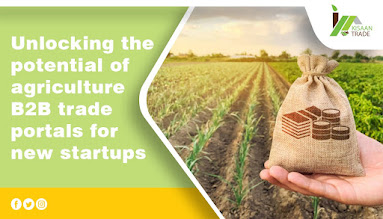Unlocking the potential of agriculture B2B trade portals for new startups

The majority of farmers in India have long experienced losses in the agricultural sector. Low land ownership, a lack of modern technology, and high-interest loans from the unregulated lending market are some of the causes of this situation. Agritech startups are working to address all of these problems by utilising cutting-edge loan underwriting techniques and technology. Opportunities for agritech startups abound as a result of the widespread use of smartphones and the internet, changes in policy, and growing investor interest. India's agritech startups have exploded onto the scene in the last five years, creating farm-to-fork brands, B2B agri marketplaces , rural fintech businesses, farmer platforms, and more. Opportunities for Business and Creative Solutions In India, the agritech industry has opened up a number of new market opportunities, particularly in terms of creating and improving market connections. These innovations include bringing farmer products directly to consumers

.jpg)
